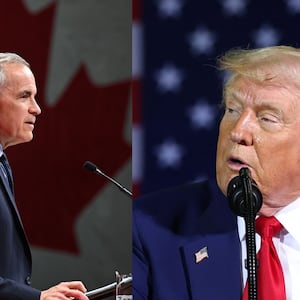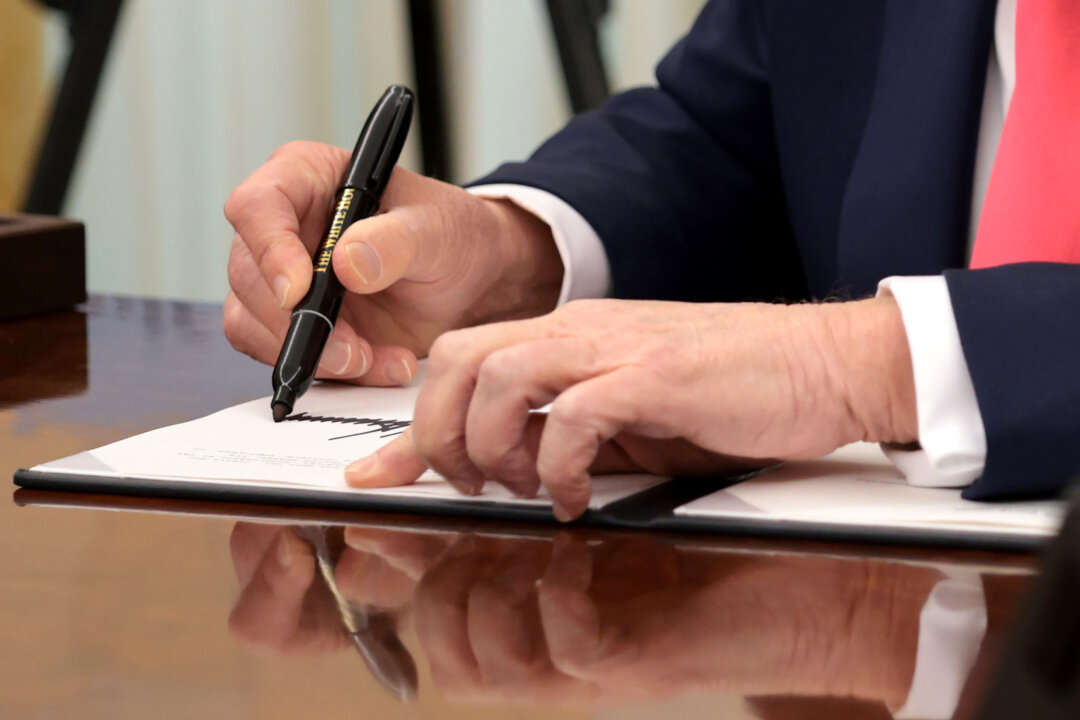We now know there are forces that can bring Donald Trump to heel, at least provisionally. Last week, we learned that the markets could compel him to stay some of his plan to impose tariffs on every other nation, albeit while keeping a universal 10 percent duty and escalating the rate on China. To be sure, the markets, in the form of major investors in the normally placid Treasury bond market, had to almost melt down in order to compel Trump to back off his desire to see every other nation’s leaders “kissing my ass,” as the real goal of his tariff policy to fellow Republicans last week.
We also learned that while Trump administration officials whose jobs entail watching the markets, such as Treasury Secretary Scott Bessent, told Trump he probably had ought to back off, at least one White House adviser, Peter Navarro, urged Trump to stay the course. Navarro is a fuck-everyone-in-our-way guy; along with Steve Bannon, he defied subpoenas requiring him to testify to Congress’s January 6th Committee, and along with Steve Bannon, he served for contempt of Congress. The question now before the nation is whether the Constitution can bring Trump to heel as the markets did last week.

Last Thursday, the Supreme Court ordered the administration to “facilitate” the extrication of a Maryland man whom the administration admitted it had erroneously deported to an El Salvador prison known for torturing inmates, despite a 2019 court order specifically banning his deportation to El Salvador because of the possibility he faced torture from the government there if returned. The Maryland resident, Kilmar Armando Abrego Garcia, was identified as a gang member on the basis of his wearing a Chicago Bulls cap and the years-old statement of an informant that he had belonged to a New York City gang, though Abrego Garcia has never lived in or near New York. He has no criminal record.
When federal district judge Paula Xinis ordered the administration to return Abrego Garcia to the United States on April 4th, the administration responded by saying the court had no power in such matters. Their argument was rejected by the Court of Appeals for the Fourth Circuit, and last Thursday, by the Supreme Court, which in an unsigned order told the administration to “facilitate” Abrego Garcia’s return. Judge Xinis immediately demanded the administration report on Abrego Garcia’s whereabouts and their efforts to bring him back by Friday morning, but when the court convened last Friday, Deputy Assistant Attorney General Drew Ensign he had nothing to report about Abrego Garcia and relayed no acknowledgment that the administration would adhere to the Supreme Court’s order.
Xinis said she was compelled to conclude that the government had “done nothing to facilitate the return of Mr. Abrego Garcia.” “There’s an easy way to combat that,” she added, “and that’s just to tell me whether you’ve done anything and if so, what.
” She thereupon ordered the administration to report to her daily on both Abrego Garcia’s status and what (if anything) the administration was doing about it, though Ensign said he might have nothing to report until early this week. So, just as the case of Trump v. Markets unfolded last week, so this week will see some playing out of the ongoing case of Trump v.
Constitution. Will the president do what the Supreme Court ordered him to do, or will he effectively declare that he can do what he damn well wants to do, Court and Constitution be damned. He’s been warming up for this fight since well before he was re-elected, as many of the things he’s already done in his second term, which include that the Constitution vests in Congress, he has no power to unilaterally abolish or defund, and effectively overriding rights vouchsafed by the Bill of Rights, are in clear violation of the Constitution.
The case of Abrego Garcia, however, is the first that presents him with the clear choice of obeying a Supreme Court order or flouting it. As in the Trump v. Markets showdown, there may well be internal debate in high Trump circles as to how he should respond.
And if there’s a Peter Navarro equivalent in this go-round, it’s someone with a lot more power and savvy than Navarro: Trump’s deputy chief of staff for policy Stephen Miller. More than anyone else, Miller is Trump’s consigliere, not only channeling all of Trump’s hatreds and unquenchable urges for vengeance, but supplementing those hatreds and urges with his own. It was Miller during Trump’s first term the policy of separating small children from their undocumented parents at the border, and who bullied other Trump officials, who at the time nominally outranked him, into implementing those separations.
Today, Miller’s power appears to be even greater than it was then: His one comment during the notorious Signal chat about attacking the Houthis was sufficient to cause such nominal superiors as Vice President J.D. Vance and Secretary of State Marco Rubio to stop their second-guessing about Trump’s order—actually, to stop talking altogether—lest they risk Miller’s reporting on their doubts to Trump, and lest they risk Miller’s own ire.
Miller’s hatred for everything outside Trumpworld hasn’t abated, either. His war on immigrant children may well be rolling on: Last Monday, four officials who identified themselves as Department of Homeland Security investigators at two Los Angeles–area elementary schools demanding to meet with five students they said were undocumented immigrants: a sixth grader, a fourth grader, a third grader, a second grader, and a first grader. In a blow for rudimentary sanity and decency, the schools’ principals denied them entry.
So Trump v. Constitution continues unabated. The better part of administration valor might be for them to confirm that Abrego Garcia is alive (they probably won’t specify “and well” and certainly won’t specify “and not well”) and that they’ve sent a third-class letter to Salvadoran President Nayib Bukele saying that if he wants to send him back, they won’t stop him.
But multiple other rounds of presidential usurpation against constitutional limitations loom. One limitation particularly germane now is that of public opinion. A from late last month showed that 82 percent of Americans, including a majority of Republicans, believed a president “should obey federal court rulings even if the president does not want to.
” On the other hand, 76 percent of Republicans did agree that “the Trump Administration should continue to deport people they view as a risk despite the court order.” That poll was completed, though, before the Abrego Garcia case came to public attention, so Republican opinion about presidential obedience to a court order in a case of someone whom the administration admits they erroneously deported remains uncharted. Of course, public opinion may not carry the weight that the markets do.
As for the weight that Trump, Miller, and their tail-wagging subordinates accord to the Constitution, with its guarantees of habeas corpus and that pesky separation of powers, that remains to be seen. If that leads you to conclude that American democracy is in danger, well, you’re right..
Politics

Will Trump Obey the Supreme Court?

The case of the man mistakenly deported to an El Salvador prison now urgently poses that question.















